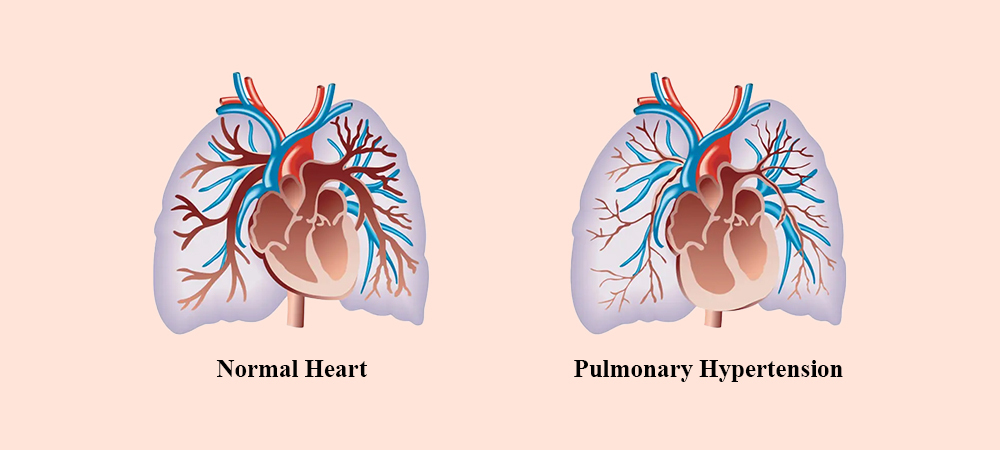
Unlike regular high blood pressure, pulmonary hypertension affects the lungs and heart, making it harder to breathe and increasing the risk of heart failure. While it can’t be cured, early treatment and lifestyle changes can help slow its progression and improve your quality of life. In this blog, we’ll explore how to reverse pulmonary hypertension naturally through effective management strategies.
Pulmonary Hypertension

Pulmonary hypertension is a type of high blood pressure that affects the arteries in the lungs and the right side of the heart. One specific form, known as pulmonary arterial hypertension (PAH), occurs when blood vessels in the lungs become narrowed, blocked, or damaged. This restricts blood flow, raising pressure in the lung arteries and forcing the heart to work harder. Over time, the strain weakens the heart, increasing the risk of heart failure.
While pulmonary hypertension can progress and become life-threatening, early intervention can help manage symptoms, improve quality of life, and extend lifespan. Although there is no cure, various treatments and lifestyle adjustments can make a significant difference.
Can Pulmonary Hypertension be Reversed
While it cannot be fully reversed, adopting a healthy lifestyle can help manage symptoms, slow progression, and improve quality of life. Below are natural strategies to support heart and lung health.
1. Maintain a Heart-Healthy Diet:
Eating the right foods can improve circulation, reduce inflammation, and support overall cardiovascular function.
If you have pulmonary hypertension, ensuring adequate vitamin D and iron intake is essential. A study found that people with this condition are more likely to be deficient in these nutrients. However, a blood test is the only way to confirm a deficiency.
To maintain balanced nutrition, consider following a heart-healthy diet like:
- The Mediterranean Diet – Rich in fruits, vegetables, whole grains, healthy fats, and lean proteins.
- The DASH Diet – Focuses on nutrient-dense foods that help regulate blood pressure.
Both diets provide essential vitamins and minerals to support heart and lung health.
2. Reduce Sodium Intake for Better Heart Health:
Salt is essential for bodily functions, but excessive intake can contribute to high blood pressure. Too much salt reduces urinary output, leading to fluid retention in the circulatory system. This can increase blood pressure and worsen current pulmonary hypertension symptoms.
To support heart health, reduce sodium intake by:
✔️ Avoiding heavily processed foods that are often high in hidden salt.
✔️ Choosing low-sodium alternatives whenever possible.
✔️ Limiting added salt in home-cooked meals and seasoning with herbs instead.
Making small changes to your diet can help manage pulmonary hypertension and promote overall well-being.
3. Exercise Regularly (But Safely)
Regular physical activity improves circulation, strengthens the heart, and enhances lung function. However, it’s essential to choose safe, low-impact exercises that do not strain the heart.
Recommended low-impact exercises:
- Walking: A gentle yet effective way to boost circulation and endurance.
- Yoga: Promotes flexibility, reduces stress, and helps improve breathing efficiency.
- Light resistance training: Strengthening muscles can help reduce overall strain on the heart.
Important: Avoid overexertion. Shortness of breath, dizziness, or extreme fatigue are signs to slow down. Always listen to your body and consult a doctor before starting any exercise routine.
4. Manage Stress and Improve Mental Well-Being:
Chronic stress can elevate blood pressure and contribute to heart problems. Managing stress effectively can support overall cardiovascular health.
Natural stress management techniques:
- Deep breathing exercises and meditation: Practices like diaphragmatic breathing and mindfulness meditation help lower heart rate, reduce anxiety, and improve oxygen intake.
- Engaging in relaxing activities: Reading, painting, listening to music, or spending time in nature can help reduce stress levels.
5. Maintain a Healthy Weight:
Excess weight places extra strain on the heart and lungs, making it harder for the body to circulate oxygen efficiently.
Practical weight management tips:
- Portion control and mindful eating: Eating slowly and paying attention to hunger cues prevents overeating.
- Consistent physical activity: Engaging in light exercise regularly helps maintain a healthy weight without overloading the heart.
6. Improve Sleep Quality:
Good sleep is essential for heart health, as it allows the body to repair itself and regulate blood pressure effectively.
Tips for better sleep:
- Establish a regular sleep routine: Going to bed and waking up at the same time every day helps regulate the body’s internal clock.
- Avoid stimulants like caffeine before bedtime: Caffeine and other stimulants can disrupt sleep, leading to fatigue and higher blood pressure.
7. Support Lung Health:
Since pulmonary hypertension directly affects the lungs, improving lung function can help reduce symptoms.
Ways to improve lung function:
Avoiding exposure to air pollution and smoking: Pollution, secondhand smoke, and chemicals can worsen lung function and increase breathing difficulties. Staying in well-ventilated areas and using air purifiers can help.
8. Consider Natural Supplements (With Medical Guidance)
Some natural supplements may support heart and lung function, but they should always be used with a doctor’s approval.
Herbal and nutritional supplements that may help:
- Coenzyme Q10 (CoQ10): Supports energy production in cells and may improve heart function.
- Magnesium: Helps regulate blood pressure and may help prevent muscle cramping.
Important: Always consult a healthcare provider before starting supplements to ensure they do not interfere with medications or pre-existing conditions.
Treatment Options for Pulmonary Hypertension
While there is no cure for pulmonary hypertension, several treatment options can help manage symptoms and reduce its impact on the body. Here are three key approaches your doctor may recommend:
1. Diuretics (Water Pills)
Diuretics help the kidneys remove excess fluid from the body, reducing fluid buildup in the lungs and circulatory system. This lowers pressure on the heart, easing strain and improving symptoms like swelling and shortness of breath.
2. Vasodilators (Blood Vessel Relaxers)
Vasodilators help widen blood vessels, improving blood flow and reducing resistance in the pulmonary arteries. By easing the workload on the heart, these medications help regulate circulation and support better oxygen delivery to the body.
3. Oxygen Therapy:
Pulmonary hypertension can reduce oxygen levels in the blood, leading to fatigue, dizziness, and shortness of breath. Supplemental oxygen provides higher oxygen concentrations, which can improve lung function and alleviate these symptoms.
These treatments, combined with lifestyle changes, can enhance quality of life and slow the progression of pulmonary hypertension. Always consult your doctor to find the best treatment plan for you. Furthermore, people can also explore clinical trials for hypertension to find new potential treatment options.
Conclusion
Managing pulmonary hypertension requires a combination of lifestyle changes and medical treatments. While it cannot be completely reversed, adopting a heart-healthy diet, reducing sodium intake, engaging in safe physical activity, managing stress, and improving sleep can help slow its progression. Additionally, treatments like diuretics, vasodilators, and oxygen therapy can further ease symptoms and enhance overall well-being. By taking proactive steps, individuals can significantly improve their quality of life. If you’re looking for how to reverse pulmonary hypertension naturally, these strategies can provide valuable support. Always consult your healthcare provider for a personalized approach to managing your condition effectively.






